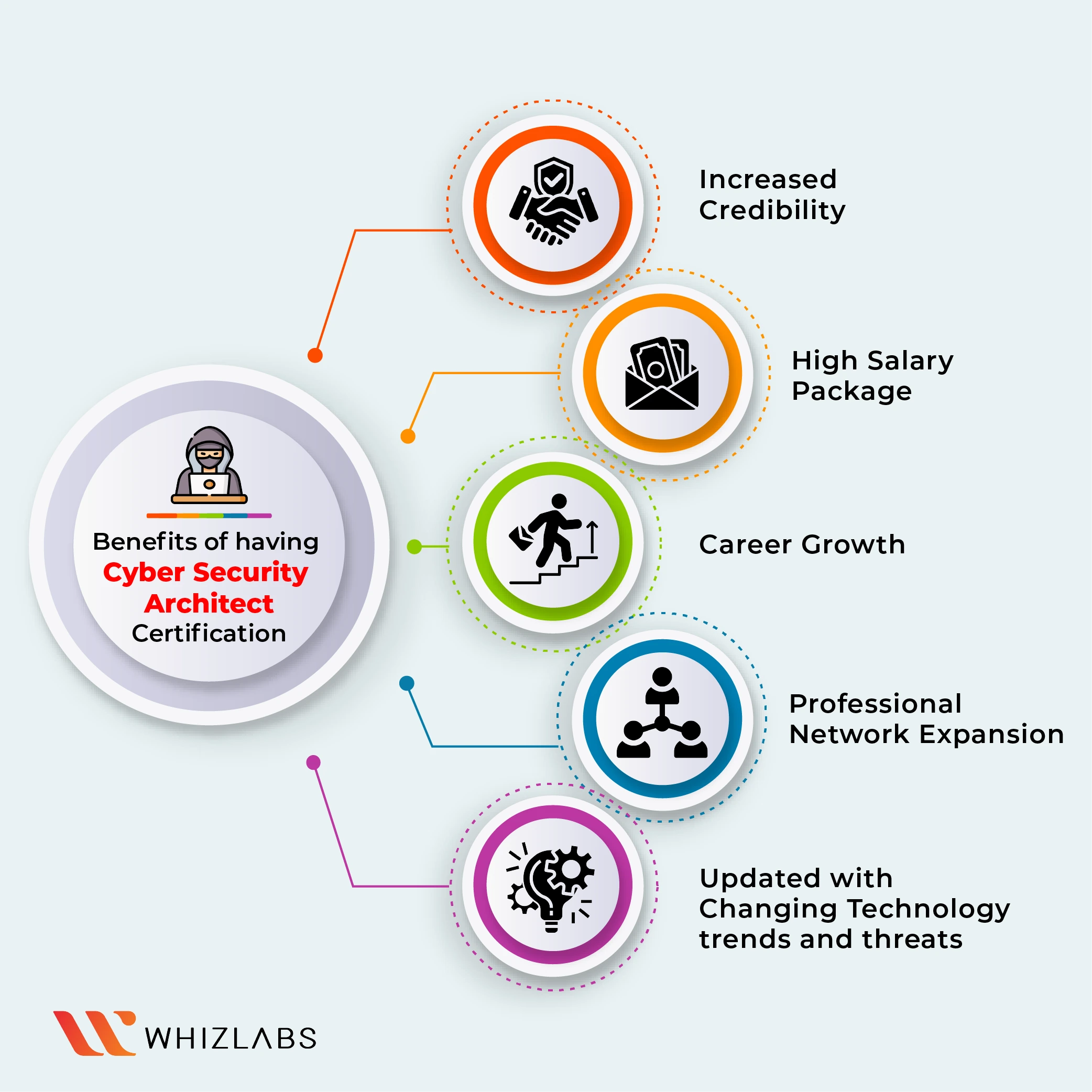In the world we live in, online crimes like Ethical hacking and fraud are everywhere. This is why cybersecurity is so important. Cybersecurity Architects are the experts who design ways to protect our information and keep it safe.
To defend against cybersecurity risks and threats, the organization is in search of cybersecurity architects to build a secure network. Therefore, pursuing a career in cybersecurity can level up career growth.
This article will explain what cybersecurity architecture is and how you can become a Cybersecurity Architect. It will show you why this career choice is great and in high demand.
Let’s dive in!
What is Cybersecurity Architecture?
A cybersecurity architecture brings together various security tools and technologies to create a strong defense against cyber attacks. It forms the foundation for protecting organizations from online threats. As the digital world evolves and organizations expand their IT services, the cyber security architecture must also be adaptable to keep up with the changing cyber threat landscape.
Who is a Cyber Security Architect?
A cybersecurity architect, also known as a “security architect,” plays a pivotal role in an organization by designing, developing, and upkeeping the security systems in its IT network. Their role will be safeguarding the computer systems and data, ensuring a robust defense against potential cyber threats.
Security architects are key personnel responsible for managing and ensuring the security of an organization’s network.
Their involvement begins from the initial design and implementation stages and continues throughout the network’s lifespan. They play a vital role in safeguarding the organization from potential risks by overseeing any modifications to the network.
These professionals are versatile in their roles, as they are involved in both defensive measures, like setting up firewalls and anti-virus software, and offensive testing, such as conducting penetration tests.
This ensures a comprehensive approach to Network security architect, protecting the organization from various potential threats.
What are the skills possessed by Security Architects?
In organizations, each one demands specific skill sets from its security architects. Here are security architect skills listed below:
- Networking Expertise: Security architects are pivotal in constructing and maintaining computer networks, making profound knowledge of computer networking principles a paramount requirement. Aspiring individuals should strive to become experts in this domain to bring drastic changes in the field.
- Malware Analysis: An effective security architect must possess a general understanding of malware and the art of malware analysis. This knowledge empowers them to safeguard network devices against insidious threats, ensuring a strong defense against malicious software.
- Leadership and Management: Given the managerial nature of this role, aspiring security architects must exhibit exceptional leadership skills. The ability to oversee projects and guide a cohesive team of employees is crucial in maintaining a secure and well-coordinated network defense.
- Risk Management: A security architect’s responsibilities mainly revolve around risk management. A strong grasp of risk management fundamentals is essential in identifying and mitigating potential risks to protect the organization from harm.
By having these vital skills, security architects can build impactful careers to safeguard organizations from various cyber threats.
Also Read : Top 10 Cybersecurity Architect Certifications
What does a Cybersecurity Architect do?
A cybersecurity architect holds a senior-level position, taking charge of a company’s computer and network security infrastructure. This role requires in-depth knowledge of the industry and the technologies used in daily operations.
As a cybersecurity architect, your main responsibility is to create security measures that protect the company from cybersecurity breaches like ransomware, ethical hackers, and Denial of Service attacks. You’ll thoroughly test the system, searching for bugs and conducting audits to ensure its safety.
To enhance security further, you may collaborate with other managers to enforce employee protocols, especially in high-security environments.
For example, you might implement policies like no unattended workstations and physical inspections upon entering and leaving the department.
As a manager, you will be responsible for training your staff, conducting interviews, and making difficult decisions, including letting people go when necessary. Staying updated on security developments is crucial, and you might attend conventions and read business publications to stay informed.
Overall, being a cybersecurity architect is a challenging but essential role in safeguarding a company’s digital assets.
Tasks and responsibilities of Cyber Security Architect
As a cybersecurity architect, your role is crucial in safeguarding the company’s technology and information systems.
Your responsibilities may vary depending on the industry and specific needs of the organization, but some core tasks are common for this position and they are:
- Understand company technology and information systems
- Design, implement, and support enterprise security systems
- Align security strategy with business and tech goals
- Identify and communicate emerging security threats
- Design architecture to counter emerging threats
- Plan and design robust security for IT projects
- Oversee vulnerability testing and risk analyses
- Balance business needs with cybersecurity requirements
- Identify and address security design gaps
- Approve installation of security technologies
- Testing security systems for expected behavior
- Write secure code and conduct application testing
- Lead and guide the security team
- Establish and maintain security policies and procedures
- Train users in security implementation
- Respond to security incidents with solutions
- Communicate security needs to upper management.
Benefits of having Cyber Security Architect Certification
As the demand for cybersecurity professionals continues to rise, being certified will give you a distinct advantage in this dynamic and crucial industry. Investing in a cybersecurity certification program is an investment in your future success and career growth.
And some of the benefits of getting this cert such as:
Increased Credibility: Getting certified in cybersecurity offers numerous advantages for individuals looking to build a career in this field. It boosts your credibility, showing employers that you possess the skills needed to safeguard their systems and data. In a competitive job market, this certification sets you apart and makes you more attractive to potential employers.
High Salary Package: Moreover, certified cybersecurity professionals are in high demand, leading to better salary packages. They can earn up to 20% more than their non-certified peers, making the certification a wise investment for increased earning potential.
Career Growth: The benefits don’t stop there. Getting cybersecurity certification opens doors to career advancement opportunities. It demonstrates your commitment to professional growth and makes you eligible for promotions and leadership roles within your organization.
Updated with Changing Technology trends and threats: Staying certified also ensures you keep up with rapidly changing technologies and threats. Cybersecurity is an ever-evolving field, and certification programs keep you informed and prepared to tackle new challenges, making you a valuable asset to any employer.
Professional Network Expansion: One overlooked advantage is the chance to expand your professional network. Certification courses connect you with fellow professionals, providing opportunities for collaboration and career prospects beyond your current workplace.
Cyber Security Architect Salary and Career Potential
Being a security architect requires a strategic position within your organization’s cybersecurity team.
If you find satisfaction in collaborating with others to tackle intricate challenges and are comfortable stepping away from hands-on technical tasks, then pursuing a career in security architecture might be a perfect match for you.
As an advanced-level position, security architects often enjoy higher compensation compared to their cybersecurity counterparts. According to Glassdoor.com statistics Data breaches for 2024 revealed that the average base salary for security architects stands at an impressive amount of $175,766 per year.
How to Become a Cyber Security Architect?
The path to becoming a security architect demands constant preparation and perseverance. Aspiring professionals should be aware that this role is not an entry-level position. And it requires 5 to 10 years of experience with a main focus on cybersecurity practices and expertise.
To become successful in this rewarding journey, individuals must have a personalized career plan.
Get a degree: Deciding on the type of degree to pursue is crucial, and both generalized computer science degrees and specialized cybersecurity degrees can prove beneficial. Additionally, identifying suitable stepping-stone careers to gain relevant experience is essential and requires thorough research.
As a starting point, the candidate should attain at least a bachelor’s degree in a related field, such as cybersecurity or computer science.
However, since security architects are management-level professionals, obtaining a master’s degree in cybersecurity or a related discipline might be a common requirement. In some cases, experience in related fields could be considered a substitute for a master’s degree.
Apply for entry-level positions: Gaining experience through progressive roles is vital. Most security architects begin their journey in entry-level positions, gradually advancing into intermediate roles before reaching the esteemed position of a security architect.
Job titles like system administrator, security engineer, security specialist, and security analyst can serve as excellent stepping stones.
Taking cybersecurity certifications: Certifications play a significant role in the cybersecurity domain, and aspiring security architects should pursue them to validate their skills and enhance their resumes.
Certifications like CompTIA Security+ are excellent starting points, while more advanced ones like CISSP certification cover comprehensive cybersecurity domains. A plethora of intermediate certifications, such as CEH, OSCP, CCSP, CISM, and CISA, can further augment one’s expertise.
Once the education, experience, and certifications are in place, the next step is to apply for security architect positions. Online job platforms like Indeed, Glassdoor, and LinkedIn can be valuable resources for job hunting.
Develop your cybersecurity skills: However, the journey doesn’t end with obtaining the role. A security architect’s education is never-ending and a candidate must know the latest cybersecurity trends and technologies to shine in this field.
To stay updated on emerging threats and evolving security techniques, attending specialized cybersecurity programs is indispensable for security architects to excel in the cybersecurity field.
Know More : Examining the future of cybersecurity and importance of SC-100 certification
FAQs
How long does it take to become a cybersecurity architect?
To become a Professional cybersecurity architect, you need 5 to 10 years of experience in the cybersecurity field. And must have a well-through understanding of security concepts.
Is cyber security architect a good career?
Taking cybersecurity architect certification is the best option for those who want to upskill their career in cybersecurity. By pursuing a career in cybersecurity, one can get a wide range of opportunities, salary, and so on.
How do I become a cybersecurity architect?
To become a cybersecurity architect, begin with the following steps:
- Start with an entry-level cybersecurity-based jobs
- Get a degree in computer science
- Improve your cybersecurity skills
- Try out cybersecurity certifications
What is the salary of a security architect in the USA?
The average pay for Security Architect is found to be $2,44,767 per annum in the United States.
What does cybersecurity do?
A cybersecurity architect serves as a key figure in safeguarding an organization’s computer and network security infrastructure. They hold a senior-level position, taking charge of planning, designing, testing, implementing, and maintaining robust security measures.
With their expertise, they play a crucial role in protecting the organization from potential cyber threats and ensuring the safety of sensitive data and critical assets.
Is coding knowledge necessary for cybersecurity architects?
Coding skills are not typically required for most entry-level cybersecurity jobs. However, as cybersecurity professionals aim for higher-level positions and career advancement, coding abilities may become essential.
Conclusion
Hope this article covers everything about how to become a cybersecurity architect in Cybersecurity industry and also walks you through some of the skills, salaries, and job opportunities.
If you are interested in becoming a cybersecurity architect, you can start by acquiring essential certifications. These certifications will help you build the necessary skills and knowledge to excel in this field.
So, if you believe this profession suits you, taking the SC-100 certification would be a great way to begin your journey as a cybersecurity architect.
If you have any doubt about this Cybersecurity Architect blog post, feel free to comment to us!
- 7 Pro Tips for Managing and Reducing Datadog Costs - June 24, 2024
- Become an NVIDIA Certified Associate in Generative AI and LLMs - June 12, 2024
- What is Azure Data Factory? - June 5, 2024
- An Introduction to Databricks Apache Spark - May 24, 2024
- What is Microsoft Fabric? - May 16, 2024
- Which Kubernetes Certification is Right for You? - April 10, 2024
- Top 5 Topics to Prepare for the CKA Certification Exam - April 8, 2024
- 7 Databricks Certifications: Which One Should I Choose? - April 8, 2024




